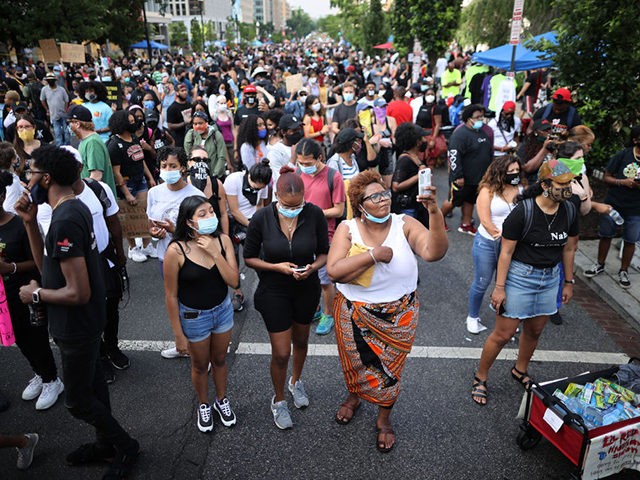The woman in charge of health for the District of Columbia said at a press conference Monday that there have been no new cases of the coronavirus linked to large anti-police protests in the nation’s capital.
“We have not seen or heard our new cases report their exposure being associated with mass gatherings,” said Dr. LaQuandra Nesbitt. “That being said … we continue to have mass gatherings so that doesn’t allow us to exclude mass gatherings as a … potential source for exposure.”
The DCist reported on the press conference:
Nesbitt said it can take up to 20 days for changes in community conditions to be accurately reflected in the data. It’s now been about 30 days since the largest of the mass gatherings in the District and the data does not show a jump in relation to them, says Nesbitt.
There was understandable concern from local officials and public health experts that thousands coming together in mass gatherings to protest the murder of George Floyd could lead to a surge in coronavirus cases. Many protesters knew the risks but took to the streets anyway with the country in “midst of two public health crises.”
Bowser urged all those who did protest to get a test. While testing numbers have increased in D.C. since the beginning of June, challenges existed in meeting these testing needs and getting results back in a timely fashion both in D.C. and elsewhere in the region.
Nesbitt said “household contacts,” “essential activities,” and other activities that have picked up since restrictions in the district have eased have resulted in new cases.
D.C. is currently in phase two of reopening, which means that people can gather in groups up to 50. Restaurants and those businesses dubbed “non-essential” can operate at a 50 percent capacity.
“Public health experts decried the anti-lockdown protests as dangerous gatherings in a pandemic. Health experts seem less comfortable doing so now that the marches are against racism,” the New York Times reported:
Catherine Troisi, an infectious-disease epidemiologist at the University of Texas Health Science Center at Houston, studies Covid-19. When, wearing a mask and standing at the edge of a great swell of people, she attended a recent protest in Houston supporting Mr. Floyd, a sense of contradiction tugged at her.
“I certainly condemned the anti-lockdown protests at the time, and I’m not condemning the protests now, and I struggle with that,” Dr. Troisi said. “I have a hard time articulating why that is OK.”
“I am still grappling with that.”
Follow Penny Starr on Twitter

COMMENTS
Please let us know if you're having issues with commenting.